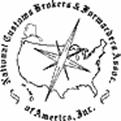Importer Security Filing (ISF/"10+2") now mandatory for ocean vessel shipments arriving at U.S. Ports.
On January 26, 2009, the new rule titled Importer Security Filing and Additional Carrier Requirements (commonly known as "10+2") went into effect. This new rule applies to import cargo arriving to the United States by vessel. Failure to comply with the new rule could ultimately result in monetary penalties, increased inspections and delay of cargo.
What is an Importer Security Filing?
Under the new rule, before merchandise arriving by vessel can be imported into the United States, the importer or their agent (e.g. Customs Broker, Freight Forwarder or Steamship line), must transmit electronically certain data elements to U.S. Customs at least 24 hours prior to the container being loaded on the mother vessel (the vessel that will call on the first U.S. port). This requirement only applies to cargo arriving in the United States by ocean vessel: it does not apply to cargo arriving by other modes of transportation. Remember, even when using a broker, the importer of record, is ultimately responsible for the correctness of the entry documentation presented to CBP and all applicable duties, taxes and fees.
Where can I Find More Information?
For more detailed information about the Importer Security Filing requirements, please see CBP.s webpage on Importer Security Filing below. There you will find a link to Frequently Asked Questions and recordings of recently conducted ISF webinars for small to mediums entities (ISF Outreach).) Additional assistance is available from us, your licensed Customs Broker, trade associations and local trade centers.
http://www.cbp.gov/xp/cgov/trade/cargo_security/carriers/security_filing/



Important Links